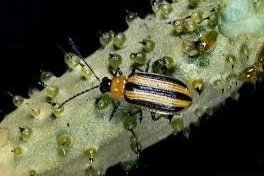Homemade Pest Deterrents: Natural Solutions for Aphids, Cucumber Beetles, and More
It all begins with an idea.
Keeping your garden healthy doesn’t always mean reaching for chemical pesticides. In fact, some of the best organic pest control methods are already in your kitchen or garden. By combining homemade sprays, natural repellents, and companion planting techniques using plants like sunflowers, radish, and even spices like cinnamon, you can keep aphids, cucumber beetles, and other common garden pests at bay.
Below, I’ll walk you through detailed, proven homemade deterrents that are safe, affordable, and eco-friendly.
1. How to Control Aphids Naturally
What they do: Aphids are tiny green, black, or white insects that suck the sap from plant leaves and stems. A small infestation can quickly grow into a swarm, stunting plant growth and spreading diseases.
Homemade Aphid Sprays and Remedies
Soap & Water Spray (Classic Organic Solution)
Mix 1–2 teaspoons of mild liquid soap (like castile or fragrance-free dish soap) with 1 liter of water.
Pour into a spray bottle and mist the affected plants, focusing on the undersides of leaves where aphids hide.
Repeat every few days until the infestation reduces.
Cinnamon Aphid Spray (Extra Protection + Fungus Control)
Mix 1 teaspoon ground cinnamon with 2 cups warm water.
Let it steep overnight, strain, and spray directly onto infested leaves.
The smell repels aphids, while cinnamon’s natural antifungal properties help protect against mildew and mold.
Encouraging Beneficial Predators
Plant sunflowers near your vegetable patch. Their tall stalks attract ladybugs, lacewings, and small birds, which are natural predators of aphids.
Sunflowers also act as a trap crop, luring aphids away from delicate vegetables.
2. Natural Ways to Deter Cucumber Beetles
What they do: Cucumber beetles are striped or spotted insects that chew on cucumbers, squash, pumpkins, and melons. They also spread bacterial wilt, a disease that can wipe out entire crops.
Organic Beetle Control Methods
Radishes as Trap Crops
Plant radishes alongside your cucumbers.
Cucumber beetles are highly attracted to radish leaves, so they’ll focus on the radishes instead of your cucumbers.
You can later sacrifice the radishes (remove and destroy beetle-infested leaves) to protect your main crop.
Neem Oil Spray (Strong Organic Insecticide)
Mix 1 teaspoon neem oil, ½ teaspoon liquid soap, and 1 liter of water.
Spray this mixture onto cucumber leaves once a week.
Neem interrupts beetle feeding and prevents them from laying eggs.
Sunflower Barrier Planting
Surround cucumber beds with rows of sunflowers.
Their tall stalks act as a physical barrier and attract insects that prey on cucumber beetles.
Sunflowers also lure beetles away, reducing the damage to your cucumbers and melons.
3. Extra Homemade Pest Deterrents
These DIY solutions help repel a wider range of garden pests without resorting to harmful chemicals.
Cinnamon Powder as Soil Protection
Sprinkle ground cinnamon at the base of seedlings to repel ants, fungus gnats, and some beetles.
Bonus: cinnamon prevents damping-off disease, which often kills young plants.
Garlic & Chili Spray
Blend 5 garlic cloves + 2 chili peppers + 1 liter water.
Strain and add a teaspoon of mild soap before spraying on plants.
The strong scent and taste repel caterpillars, mites, and leaf-eating insects.
Radishes Beyond Cucumber Beetles
Radishes deter flea beetles that attack brassicas (like kale, cabbage, and broccoli).
You can use them as a living shield for more valuable crops.
Companion Planting with Sunflowers
Sunflowers not only distract pests but also provide nectar for pollinators.
Planting them near beans, cucumbers, or squash boosts pollination while minimizing pest pressure.
4. Why Choose Homemade Pest Deterrents?
Safe for People & Pets – No toxic chemicals lingering in your garden.
Budget-Friendly – Most ingredients like cinnamon, garlic, or soap are already in your kitchen.
Eco-Friendly – Supports a balanced ecosystem by encouraging beneficial insects instead of wiping everything out.
Multi-Purpose – For example, cinnamon works as both an insect deterrent and an antifungal.
5. Final Tips for a Pest-Free Organic Garden
Monitor plants regularly—early detection makes pest control easier.
Rotate crops each season to reduce recurring infestations.
Combine multiple strategies (e.g., soap spray + trap crops + sunflowers) for stronger protection.
Stay consistent—natural methods work best when applied regularly.
🌻 Bottom line: With just sunflowers, radishes, cinnamon, and a few homemade sprays, you can create an effective, chemical-free defense system for your garden. Your plants will thank you with stronger growth, healthier harvests, and fewer pests.


